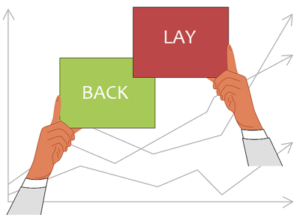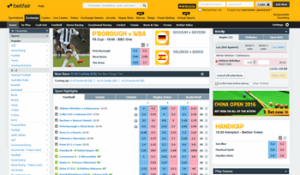 With the phrase “sports betting”, most people will think of a high street bookmaker or an online site. That’s because most sports punters are familiar with traditional fixed-odds bookies. They create odds for various sports markets that people are able to place wagers on. In exchange for this service, the sportsbooks build in a profit margin into their markets. This is usually given the name of “juice” or “vig”. This means whatever the outcome of the event they will usually make money and the customers overall will usually lose. That’s how the business works.
With the phrase “sports betting”, most people will think of a high street bookmaker or an online site. That’s because most sports punters are familiar with traditional fixed-odds bookies. They create odds for various sports markets that people are able to place wagers on. In exchange for this service, the sportsbooks build in a profit margin into their markets. This is usually given the name of “juice” or “vig”. This means whatever the outcome of the event they will usually make money and the customers overall will usually lose. That’s how the business works.
Betting exchanges have been around for a while now but they haven’t achieved the same level of popularity as standard sportsbooks. The prime difference with an exchange is the exchange itself doesn’t take your bets, instead they match bets between different people. Known as peer-peer betting it means you can back a bet, as you would with a normal bookie, but instead it is offered to you by another customer, who is laying the bet to you.
Exchanges take a commission, usually between 2-5%, on winning bets. As someone out of either the backer or the layer has to win a bet it means the exchange always takes a commission from all transactions This commission is lower than the average margin most sportsbooks run and so on the whole exchange odds are better than typical fixed odds.
The fact you can also offer bets gives another dimension to the exchange. You can lay bets to other people on an exchange and in effect act as your own micro bookie. Let’s say you don’t know who will win a race or tournament but you have a strong feeling on a selection you think will not win you can lay that selection for someone else to back. You win in this scenario if the selection loses, which is the opposite to a typical bet where we back an outcome.
There are a lot of benefits therefore to using an exchange including better value odds in general and the ability to lay bets as well as back them. There are, however, some drawbacks that put customers off, such as a lack of promotions and poor liquidity and less market depth in some areas. Here, we’re going to look at some possible reasons why exchanges are languishing.
How A Betting Exchange Works
 On the outside, you may not see any immediate difference between exchanges and bookies. The key elements of both are to provide sports betting. Exchanges allow players to wager on sports the same as a standard bookmaker does. Yet there is also a key difference, and that is when it comes to the odds surrounding the sports. An exchange does not have any say in the creation of those odds, which is unlike a sportsbook.
On the outside, you may not see any immediate difference between exchanges and bookies. The key elements of both are to provide sports betting. Exchanges allow players to wager on sports the same as a standard bookmaker does. Yet there is also a key difference, and that is when it comes to the odds surrounding the sports. An exchange does not have any say in the creation of those odds, which is unlike a sportsbook.
An exchange offers a simple platform, it is the gamblers who create the markets at the exchange by either “backing” or “laying” their wagers. A backer bets on an outcome to win, while a layer will back the alternative, wagering on it to lose. Either of these sides can set the initial bet, odds and price. One other party needs to agree to the conditions surrounding the betting market. From that a valid wager is possible at either end, this is then known as a matched bet.
The backers are pretty much like standard sports bettors while layers are sort of like the bookmaker, agreeing to pay the backer if the outcome of the wager is successful. But unlike a traditional sportsbook, layers don’t need to build in margins like bookies do. The operator of these exchanges only takes a small commission as a payment for providing the service and that commission is only payable by the person who wins. You can read more about how exchanges work on our main exchange page.
The Advantages of Exchanges
 Exchanges initially were very much feared by the old high street bookies when they came online at the turn of the millennium. As time as gone on exchanges have actually turned out to be really useful, especially to bookies. Betting sites now actually set their own odds and markets and adjust them over time based on what is happening on exchanges. They even lay their own liabilities on the exchanges if they have over exposed positions for a certain market.
Exchanges initially were very much feared by the old high street bookies when they came online at the turn of the millennium. As time as gone on exchanges have actually turned out to be really useful, especially to bookies. Betting sites now actually set their own odds and markets and adjust them over time based on what is happening on exchanges. They even lay their own liabilities on the exchanges if they have over exposed positions for a certain market.
The reason bookmakers use exchanges like this is because the exchange itself is a gauge of public opinion as the backers and the layers are individual members of the public. Exchanges are used to measure which way markets are moving and this allow bookies to adjust their own prices as appropriate, making it less likely they get caught out by sudden changes that have a big effect on betting markets.
The fact that exchanges measure public opinion means they are often extremely accurate in measuring real world probabilities. It is like the ‘guess how many sweets in a jar’ game, if you get a lot of people to guess and average the answer it will always be close to the real value. Exchanges have been better than any poll or bookmaker in predicting the winner of elections, for example, and in almost anything where public opinion matters.
The advantage of an exchange for the punter is generally better odds when backing bets along with the ability to lay outcomes too. The fact odds are also fluid and they move over time means exchanges can be used for back-to-lay betting. This means you can back a selection and if the odds decrease on that selection, pre-event or in-play, you can lay it too and ensure a positive return either way. It is a technique that so called ‘professionals’ use but it is open to anyone and you can find plenty of back-to-lay calculators online.
Given The Benefits Why Are They Not More Popular?
 Exchanges do have their downsides and one big one is market availability. For a market to be created someone needs to lay it and someone needs to back it at those odds. This is easy enough for popular football, racing, tennis bets, etc., but can become more problematic with more obscure sports and events or more complex markets.
Exchanges do have their downsides and one big one is market availability. For a market to be created someone needs to lay it and someone needs to back it at those odds. This is easy enough for popular football, racing, tennis bets, etc., but can become more problematic with more obscure sports and events or more complex markets.
The amount of money in a given market is known as liquidity and big markets can have liquidities running into the millions, indeed US elections have been known to run into the billions. A lot of the less popular markets have poor liquidity, however, and this can often mean no betting options or poor odds.
Ultimately a fixed-odds sportsbook can offer betting markets and it doesn’t matter if people don’t back all of the outcomes. This isn’t possible in an exchange. For this reason you also can’t do more complex bets like bet builders, related contingencies and specials (although you shouldn’t be betting on these anyway as they are terrible value). This is why exchanges and sportsbooks will always coexist, because an exchange can’t do everything a sportsbook can and vice versa.
Exchanges are a lot more focused on the major markets as a result. Many people are willing to lay odds on a Premier League game, for example, but the same is not true when it comes to the Estonian Cup or the Qatari Stars Cup. Those options are more likely to be on offer at a sportsbook instead of an exchange.
Something else that stands out about sports bettors is their love for promotions. Online sports betting sites often provide these in bucketloads. And that can be a very appealing part of why people sign up to these platforms. Exchanges don’t flow in that sort of trajectory. They may have low commission levels, but that means they need to make up the loss. Free bets and deposit bonuses at exchanges are terrible in comparison to sportsbooks.
Of course, in reality the low commission cancel the promotions out and more. Bettors will get more long term value using exchanges to bet than using sportsbooks with promotions. Yet casual bettors aren’t likely to be appreciative of exchange offers and lots of people like offers. It is this lack of incentive and the very professional layout that puts a lot of punters off exchanges. Some people bet solely or mostly for enjoyment rather than necessarily to win overall, these types of people are harder to convert for exchanges and it is one reason why despite the obvious value that exchanges are not more popular.
One final point to make about exchanges is that they can come across as being quite confusing. Sportsbooks sometimes look that way too, although they aren’t so difficult. Especially after placing a couple of bets. There is a lot more going on when it comes to exchanges, though. This is further highlighted when making your own markets and odds. They aren’t quite as self-explanatory as sportsbooks.
Exchanges allow you to be a backer or a layer, and they offer the chance to create odds. This can be overwhelming. That stands out even more so if you’re new to sports betting in general. Anyone starting out with this will definitely find sportsbooks to be easier. At least, to begin with. Thus, exchanges don’t get as much of a look in due to the confusing nature of what they offer.
Will Exchanges Become More Popular Than Sportsbooks?
 Something that has worked against exchanges is the sports industry. They have experienced a similar sort of backlash as sports betting did in the early days. Journalists have questioned whether they are good for the sports industry. The Guardian, one of the more credible media setups in the UK, asked this in 2007. Later on in 2018, the same newspaper reported on illegal Asian exchanges. In that report, the British Horseracing Authority said they were bad for racing. There is little doubt that exchanges have had a negative impression put on them.
Something that has worked against exchanges is the sports industry. They have experienced a similar sort of backlash as sports betting did in the early days. Journalists have questioned whether they are good for the sports industry. The Guardian, one of the more credible media setups in the UK, asked this in 2007. Later on in 2018, the same newspaper reported on illegal Asian exchanges. In that report, the British Horseracing Authority said they were bad for racing. There is little doubt that exchanges have had a negative impression put on them.
In years past, some people have suggested that exchanges would surpass sportsbooks, at least when it comes to their popularity with bettors. Yet those predictions haven’t come to fruition and the reasons mentioned earlier could be why that is the case. While betting exchanges do offer a nice alternative to experience, they have issues. That’s the same with everything, but exchange problems stand out.
You may not lose as much to an exchange operator in commission and you may be able to lay wagers as well as create odds yourself, yet there is a big issue surrounding liquidity. A smaller number of betting markets are available and they are not quite as simple to understand as with sportsbooks. Throw in the meagre betting offers, and exchanges aren’t bright shining lights. They’re very credible alternatives, but definitely not better than sportsbooks in the eyes of many people. There is a lot to unwrap with exchanges, and this is especially true if you’re used to bookmakers. The likelihood is that most bettors like to stick with what they know.
Ultimately exchanges make betting more transactional. It is why professionals use them, because they are ultimately about trying to win money. As eluded to before not everyone bets just to win, the process of betting itself, using offers, etc., can be part of the experience. This type of customer are not going to be won over by the more sterile nature of an exchange and this means they are unlikely to surpass sportsbooks any time soon.
It is not definitive that betting exchanges are better. Different, yes. An alternative, yes. But better? Not in all respects. Sportsbooks will always have their fans. And a lot of that is due to the simplicity of using them and their familiarity. Anyone who hates bookmaker margins will likely enjoy exchanges instead. But those who like special offers isn’t likely to. It’s all about personal taste in the end. And sportsbooks win out a lot of the time because of the variety. More sports. More markets. Better betting offers. And so on. Yes, they have worse odds in general but surprisingly that isn’t the focus for a lot of people who bet.